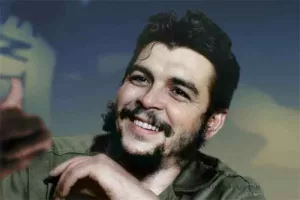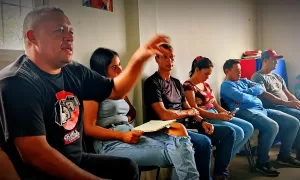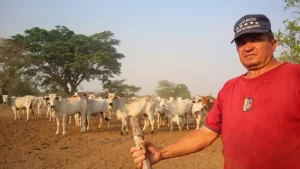Bob Dylan once said, “Let us not talk falsely now, the hour is getting late.” February 23rd, 2019, was the day that Juan Guaidó, the self-proclaimed President of Venezuela, had “authorised” “humanitarian aid” to enter Venezuela, an attempt to force the Maduro government, and thus the Venezuelan people, to their knees. There is great urgency as an ever-increasing escalation of violence is being perpetuated by those who would destroy Venezuela, including several attacks on Venezuela’s electrical grid over the last few weeks. But let me be clear: the Venezuelan poor are resilient, and any change will be on their terms. Most importantly, Venezuelan politics is collective, and there is a deep form of solidarity across communities along with an abiding interest in building a different form of politics. In short, if one does not unearth this collective politics, one cannot understand what is happening in Venezuela.
While in Venezuela doing field work in July 2018, in conversations with many Venezuelans, I noted the consistent insistence that Venezuela must be respected.
A primary feature of Venezuelan life is that politics is not only discussed but is everywhere, and as such, many Venezuelans could teach graduate courses in political science. This is well exemplified in a recent news item on the Real News Network in which a woman on the street, clutching a well-worn copy of the constitution, says to the interviewer, “If Juan Guaidó needs a constant reminder” she “will be happy with her fellow citizens to read him the constitution every day”. That a factor of everyday life is the importance of the Venezuelan constitution is not to be discounted and helps us understand something essential: the gravity of politics for Venezuelans. Another core aspect of this is the ease with which poor Venezuelans viscerally, expressly, and collectively are directly involved with politics. It was not always thus.
Pacted Political System
Early in the twentieth century, oil was found in Venezuela. Soon Venezuela’s elites became capitalist, rich beyond imagination, and they also grew concerned that they faced too much disruption from rural and urban crowds who had a tendency toward fomenting strikes and other political upheavals. In 1958, three political parties implemented a pacted political system wherein in one election, Action Democratic would win, and in the next election, the Social Christians would win, and so on. While the third party quickly disappeared, this pact, which continued for several decades against the threat of communist organising and against the poor, eventually joined by the Catholic Church, business leaders, and even unions.
In the 1970s, following a successful decade of pacted democracy, flush with oil monies, the Venezuelan state started a few social welfare programs. While some Venezuelans began to experience a measure of relief, poverty persisted. Then in the early 1980s, the state shut off the small flow of oil money to the poor, and thus, poverty in Venezuela grew to 62 per cent, and extreme poverty grew to 30 per cent.
In 1989, in the wake of re-electing Carlos Andres Perez as president, Venezuelans were hopeful. However, in the week after his inauguration, Venezuelans learned Perez intended to integrate the state even closer with global capital, pushing further austerity. In response, on February 27, 1989, a series of bus and food riots started that lasted almost a week. This revolt throughout Venezuela by the poor against the state and society was called the Caracazo ( the explosion of Caracas). In its attempt to quell the revolt, the state killed upwards of 2000 people. Nevertheless, since the Caracazo, the state and elites found themselves unable to govern Venezuela as before.
Rather than the elites governing Venezuela, the poor, those who were starving, those informally working, other workers including the underemployed or unemployed, farmers, Afro-Venezuelans, Indigenous Venezuelans, the differently abled, LGBTQ, youth, seniors, women working in their homes caring for their children, women working outside the home and then keeping house, people forgotten by politics of exclusion, came down from the barrios (means neighbourhoods, especially the slums of urban cities), changing Venezuela. Consider that for the next decade the average number of protests grew to over 1000 per year, an increase from the pre-1989 average of 200, signifying that all-across Venezuela there were at least two protests every day during this period. In 1992, a Colonel in the Venezuelan army, Hugo Chávez Frías, led an attempt to end the state’s continued repression, and when this failed, he took responsibility for it. Chávez, born poor, being Afro-Indigenous, recognised that the marginalised had to be the major force in any political project geared toward their particular and specific needs.
The Revolution, Cemented
After serving some time in jail, Chávez ran for president in the 1998 elections. His win did not start the revolution, but rather, cemented it. While still an uphill battle, even with Chávez at the helm, the state itself was restructured to support communities. This restructuring was unthinkable just prior to his election. Turning it into something quite unthinkable to us here in Canada. In him, the poor found a friend, a teacher, a comrade. Now without him, a common phrase is that “Chávez is a seed in all,” and this keeps them fighting.
Many benefits continued to accrue to those from whom Venezuela’s wealth had once been robbed, including huge advances in access to healthcare, education, and a general well-being for all Venezuelans, especially the poor. Pursuant to Nicolás Maduro’s second election, twenty years since Chávez’s first, unlike in many other states around the world that impose austerity and neoliberally reorganise state services, there remains in Venezuela the sense that the state must provide for its citizens. Significantly, the current economic and political crises under such intense misinformation and international scrutiny are not the result of Venezuelan state policies. While some monetary inflation is an indirect result of state policies, the crises are a direct result of speculation and inflation sparked by Venezuelan capitalists and the horrific interventions, meted out by some nations, including Canada and the USA, such as sanctions and blockades.
On one hand, free or low-income housing, universal healthcare, public and universal education (including the distribution of free tablets or computers to all children), subsidised gas, the provision of basic food stuffs to all who need it—the Venezuelan state’s social programs remain sturdy despite the manufactured economic and political crises of 2019. When I was there in July 2018, because the cost to print urban public transit tickets in Caracas was more expensive than the government was willing to make the price, public transit was free. Of course, Maduro remains accused of “buying votes” via these programs.
The beneficiary of current Venezuelan government policies continues to be the poor themselves. Significantly, what has been Venezuela’s strength even more than the social welfare policies themselves, as revolutionary as they are in this current world of austerity, is the fact of community control of this revolution, for they control the process. Through Chavismo, many communities have arranged themselves into organisations as community councils, misiones, and various other forms of assemblies. The government is involved, e.g., the government mandates that a community council is to be constituted of two hundred families (less in rural and Indigenous areas), must meet quorum, etc., and then the government provides funds to the community organisation based on the mandates to provide various social services and to foster community production. The government provides support, but these organisations are run by the communities themselves, and they have done so for the past two decades. Presently, tens of thousands of such community organisations exist throughout all of Venezuela.
There has also been exponential growth in communes throughout Venezuela. In areas where several community councils intersect (thousands of members in the cities, less in the rural areas), further entrenchment of community organisations has been fostered. Communes that intersect have begun to institute communal cities of 20,000 members each. These institutional structures, and the communities’ protagonism and cooperation forming them, reveal the depth of the change during the last two decades in Venezuela.
One thing is clear: in all of these social endeavors the revolution is constituted through the multiple tendencies of Chavismo, and it is only through the masses in their work against all forms of domination that the revolutionary state exists. Notably, Chavismo is a consciously socialist-feminist practice throughout all of Venezuela. Many communities that before were denied their dignity, have collectively altered their country based on principles of social equity and egalitarianism. Changes have been happening here that have rarely happened at any point in human history.
To be certain, Venezuela as a country remains capitalist, colonial, racist, machista, and embedded in imperialism’s world; the state is a state with all of its corresponding dangers. Significantly, the Venezuelan state is not the site of counter-revolution. Even though it is a residual capitalist state, against which the masses constantly battle for their gains, it is not the state who wars against the masses; rather in Venezuela, the state is with the masses’ revolution. Although new elites have emerged, and problematise the revolution, the revolution is neither the state nor the new elites, and for sure, it is not the old elites. Rather, even though in any society in which they exist they are the fulcrum, it is the poor’s gravitonic pull which explains politics in Venezuela, and in Venezuela the poor have begun the slow and long process of ending these residual conditions of inhumanity.
Elites Try for a Comeback
No longer rulers of Venezuela, the old elites after Chávez’s death in 2013 and with the subsequent fall of oil prices, saw an opportunity to reassert themselves, attempting to construct a perfect storm by increasing their economic war against their fellow citizens. Excluded from their “natural place” at the top of state and society, the elites remain frustrated; they have been ineffectual against the masses. World leaders as “diverse” as Trudeau, Harper, Martin, and Chrétien; Bush, Obama, and Trump; and many others of Latin America and the European Union have also long hated the revolution.
There are many reasons for the imperial desire to end the Bolivarian revolution, including wanting to suppress the control and involvement exercised by the Venezuelan people over themselves. The fact that Venezuela is rich in natural resources such as petroleum, natural gas, gold, bauxite, iron ore, and diamonds just adds to the frustration with the revolution. These “leaders” have contributed to the economic war with ever increasing sanctions (especially since early 2015) and blockades of imported essentials such as medicine, food, and other goods—a war that has had quite a violent outcome against a sovereign people.
Presently, high inflation is a serious problem in Venezuela, but significantly, neither production nor distribution are under government nor specifically community control. Private ownership and the imperial blockades strangle the Venezuelan economy, “making it scream” (As Nixon and Kissinger conspired to do in the Chilean economy against the experiment of socialist-democracy in the early 1970s in Chile). An example of how Venezuelans resist this problem can be seen in the growth over the last decade of urban cultivation, and in their return to the land to produce what they need.
Loyalty to the revolution is evidenced in the outcomes of the last several elections. In both 2014 and in 2016–2017, the opposition held increasingly violent protests. In the December 2015 election, the National Assembly (AN, 167 seats total) was completely flipped in favour of the opposition, which won 109 seats and received almost 8 million votes in contrast to the Chavista parties who received almost 6 million votes, winning only 55 seats.
In response to the increasing violence on July 30, 2017, following constitutional procedure, a new constituent assembly (National Constituent Assembly, ANC) was elected with more than eight million votes. The ANC, plenipotentiary by definition, has more than 500 seats for both regional and sectoral representatives. Despite the opposition’s call for a boycott of the elections, the eight million who did vote is a tangible and meaningful voter expression. The day after the ANC vote, all violent protests ceased until 2019’s return to violence. This shows the value of the ANC as two years of social peace was wrought even though the brutality of the economic war remained. The persistent violence of the opposition to the revolution is clear, and the rejection of such violence by the majority of Venezuelan society is also obvious.
Since the 2017 elections of the ANC, three more Chavista electoral gains have been made, winning the majority of governorships (October 2017) and city councillorships (December 2018), flipping many opposition strongholds. Maduro also had a substantial May 2018 presidential win with more than six million votes and a hefty four million lead over the closest rival. These considerable votes are not negated, even with the opposition’s attempted boycott of the election.
The 2015 NA is old news with new NA elections long scheduled for next year. The NA itself is a remnant of old state formations contained within a contradictory process, and Venezuelans know this. The poor are waging a war on both capitalism and the capitalist state in the name of a communal state, and they know that it is only through the current Maduro / Chavista government that they can achieve their victory. While reserving their right to tell him how things should be done, Maduro remains their president.
Manifestly Venezuela’s elites have been increasingly isolated in Venezuela, especially since Chávez’s first election in 1998. In 2019, presuming to have the right to stop the Bolivarian experiment, the elites started a new initiative aimed at ending the Maduro government, and so bringing an end to the revolution. Beyond the opposition’s base, and its reliance on the obvious Trojan horse of US and Canadian “humanitarian aid,” the early 2019 gambit of Guaidó’s “presidency” has not culminated in the desired end. Neither sparking violence in the streets, nor in the claim of the “abandonment” of Maduro’s presidency, Guaidó’s coup has failed at the time of writing (the second week of April). This failure is due to the absence of the masses of Venezuela, who remain the core of any substantial change in Venezuela. Tensions remain high as the opposition claims the right to “invite” invasion to secure their power, but this only reveals their very illegitimacy.
The government, having consistently renounced violence, has always been open to direct talks with the opposition, if they too renounced violence. However, the elites are reluctant, for they know that without violence they are unlikely to prevail. The elites know that for the majority of Venezuelans, the opposition is worthless and the elites themselves are superfluous.
Concluding Thoughts
So, what can we do? Despite an inhumane blockade enacted over the past four years, Venezuelan poor continue to receive greater benefits from their government than Canadians, for example, have ever received from ours. Consequently, if what Venezuelans participate in is democracy, then what the rest of the world has is not. In short, the poor in Venezuela are the government. Thus, to support Venezuela is to fight for a better world, one wherein the poor are the government too. Fighting back against neoliberal restructuring of Canada, resisting the continued formation of the “common-sense” of austerity, resisting all of the accompanying horrors of early twenty-first century capitalist imperialist states is how we can support Venezuela.
As stated at the outset of this article, in Venezuela, it is oft repeated that “Venezuela must be respected.” This phrase is the basis for the fact that Venezuelans resist rather than simply folding in the face of aggressions by the opposition and other countries. Venezuelans have taken to heart the lessons of Chile 1973, and both the military and the Venezuelan people will defend themselves if attacked. It is also clear that there is much that we can learn from them. Nevertheless, the positive in Venezuela is still exceptional, and Venezuelan resistance to neoliberalism is ever more an example to us all. In conclusion, whilst undergoing many challenges, Venezuela remains the place where human possibilities have been flourishing, and this expression of direct democracy will be protected by Venezuelans and must be respected.
(Jeremiah Gaster is both a political theorist and a comparativist. He writes for Socialist Project, a Toronto based organisation )




